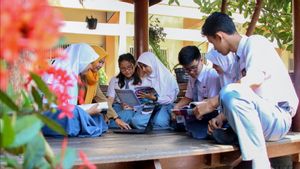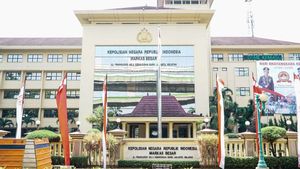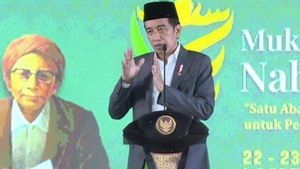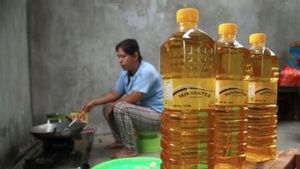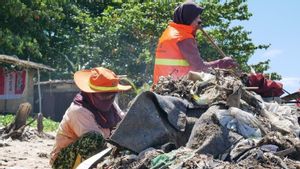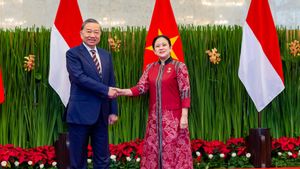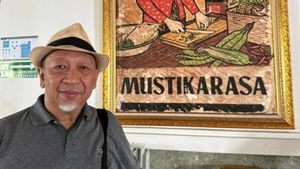JAKARTA - The Eijkman Institute for Molecular Biology (LBM) was officially merged with the National Research and Innovation Agency (BRIN). Various causes of concern for the fate of the world of science arise. But when you think about it, what else can be expected from a country that allocates more budget to influencers than research?
Prior to joining BRIN, LBM Eijkman was under the auspices of the Ministry of Research, Technology, and Higher Education (Kemenristekdikti). Staying engaged in molecular biology and biotechnology in the medical world, LBM Eijkman under BRIN will change its name to the Eijkman Center for Molecular Biology Research (PRBM).
Not only LBM Eijkman actually. Four other research institutions, such as the Indonesian Institute of Sciences (LIPI); National Institute of Space and Aviation (LAPAN); Agency for the Assessment and Application of Technology (BPPT); and the National Nuclear Energy Agency (BATAN) which was also merged into BRIN.
"With the integration of the Ministry of Research and Technology and four LPNKs into BRIN, we have institutionalized the status of LBM Eijkman into an official work unit, namely PRBM Eijkman under the Life Sciences Research Organization," said Head of BRIN Laksana Tri Handoko, quoted from the official BRIN website, Monday, January 3.
Why did Eijkman's merger with BRIN become a polemic?
Last weekend, at the end of 2021, the Twitter account @Eijkman_inst uploaded the news of separation. The upload also explains that the COVID-19 detection activities will be taken over by the Deputy for Research and Innovation Infrastructure of BRIN.
Research activities that have been taking place at the Cipto Mangunkusumo Hospital (RSCM) will later be transferred to the Genomics Building at the Cibinong Science Center (CSC). CSC is a research facility belonging to the Ministry of Health.
Another impact of the merger was the dismissal of 113 temporary workers who worked for Eijkman. Of that number, 71 of them are researchers. Their contract was not renewed. The so-called sudden stop.
"113 people (were fired). About 71 are honorary researchers," said Acting Head of Eijkman Wien Kusharyoto, quoted from Kompas.com, Monday, January 3.
Thank you to all Indonesian people for their 33 years of support. The Eijkman Institute has been involved in the development of Health & Drugs Molecular Biology research in Indonesia and the world. Let's keep our spirit & work ethic wherever we are. #EijkmanForIndonesia#KamiPamit pic.twitter.com/A3TWPVhN9P
— Eijkman Institute (@eijkman_inst) January 2, 2022
Wien explained that several schemes had been prepared, which would allow Eijkman's laid-off temporary workers to return to work at Eijkman. One of them, for research-based honorary staff with undergraduate and postgraduate education, they are advised to register as research-based postgraduate or doctoral students.
That way they can be recruited as research assistants at PRBM Eijkman. Wien said the registration process is still ongoing this year. And BRIN, it is said, will cover their research and tuition costs.
Head of BRIN Laksana Tri Handoko conveyed a similar explanation regarding these options. He also denied reports that the temporary workers were dismissed without severance pay. According to Tri Handoko, this is a transitional process.
"Yes, of course (being dismissed without severance pay) is not true. Except for those who are not willing to choose one of our options. Of course, we also cannot force it," said Tri Handoko.
According to Tri Handoko, so far Eijkman is not an official government agency. Its status is a project unit under the Ministry of Education and Culture. That's what makes "PNS (Civil Civil Servants) Researchers at LBME cannot be appointed as full researchers, and have the status of administrative staff."

On the other hand, the Advisory Council of the Indonesian Caucus for Academic Freedom (KIKA) Herlambang Wiratraman views that the government should not bother forcing researchers to become civil servants. According to him, the bureaucratic climate is not suitable for developing science.
This kind of bureaucratization, including the uniformization of researchers into the bureaucratic system, will erode academic freedom. Whereas academic freedom is a basic principle of scientific development.
"They are world-class scientists who actually don't need civil servant status. What kind of scientific institution do we want to place? They should have non-negotiable principles because the basic principle is academic freedom," said Herlambang, quoted by CNN Indonesia.
The chairman of the Indonesian Academy of Sciences (AIPI) Satryo Soemantri Brodjonegoro shares the same view. According to him, bureaucratization through fusion with BRIN will actually lead to delays in the development of science.
He raised the government's wrong view in research funding so far, where the government's mindset is that every research must produce tangible findings. However, according to Satryo, research is not always successful. Research also can not always be pegged in a short time.
Not to mention the punishment system in the form of budget items. In fact, according to Satryo, research funding should be through a grant mechanism.
"The money is small, the mechanism is very tight, so the researchers say they don't want to go to the government anymore because it is too busy and there are many threats of punishment. For example, the funds are not used up or are not used according to the budget," he said.
Influencer budget > research budget

In Indonesia, the research budget has always been a problem. As Satryo said: small, tight, risky. But in the regime of President Joko Widodo (Jokowi), the problem is increasing.
Turns out it's back to political will because the government can actually budget a lot of money, which unfortunately isn't for the advancement of knowledge but for opinion control through buzzers. The COVID-19 pandemic has opened our eyes to many things. Including this.
In mid-2020, Indonesia Corruption Watch (ICW) revealed findings of the Jokowi government that disbursed funds of around Rp90.45 billion. The funds have been allocated only to influencers since 2014.
"The government seems to be more concerned with the image than the health and safety of the people," said a member of Commission VII DPR RI Mulyanto at the time.
Mulyanto's words were reasonable because at that time Indonesia was confused about the ferocity of the coronavirus. Moreover, at that time it was also revealed that the budget for research institutions that were struggling with the provision of vaccines was only around Rp5 billion.
"This imbalance in budget allocation is very unreasonable in terms of its importance. Currently, people need vaccines from researchers' research more than the chatter of influencers."
At that time, Eijkman became one of the research institutions that Mulyanto was referring to. Eijkman spearheaded the Covid Research Consortium of the Ministry of Research and Technology which took part in the development of the Merah Putih vaccine.

The development was carried out by Eijkman together with a number of other national R&D institutions, including Kimia Farma from the BUMN industry side. According to Mulyanto, this condition shows the Jokowi government's low political will in developing science. Even when vaccine development is urgent.
"This needs to get President Jokowi's attention, so that we don't just become a user and buyer country, but let's encourage Indonesia to become a producing country. We can if we want,” said Mulyanto.
Back to the influencer jumbo budget. ICW researcher Egi Primayogha said the data was obtained by ICW from the Electronic Procurement Service (LPSE). At LPSE ICW conducted a search for the keywords "influencer" and "key opinion leader".
As a result, there are 40 procurement packages that refer to these two keywords. In general, ICW recorded that the total central government budget related to digital activities reached Rp1.29 trillion since 2014. A significant increase occurred in 2016 to 2017.
In 2016, the budget for digital activities was recorded at only around Rp606 million for one procurement package. In 2017, the number of procurement packages jumped to 24, with a total budget of Rp535.9 billion.
"Because we didn't see the budget document, and the LPSE is limited, it's possible that the actual number is bigger. It could be bigger than Rp1.29 trillion, especially if it is added by local governments," said Egi.
*Read other information about POLITICS or read other interesting articles from Yudhistira Mahabharata.
Other NEWS
SEE ALSO:
The English, Chinese, Japanese, Arabic, and French versions are automatically generated by the AI. So there may still be inaccuracies in translating, please always see Indonesian as our main language. (system supported by DigitalSiber.id)



